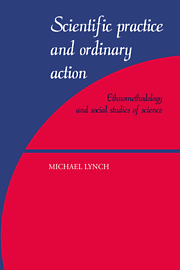Book contents
- Frontmatter
- Contents
- Acknowledgments
- Introduction
- 1 Ethnomethodology
- 2 The demise of the “old” sociology of science
- 3 The rise of the new sociology of scientific knowledge
- 4 Phenomenology and protoethnomethodology
- 5 Wittgenstein, rules, and epistemology's topics
- 6 Molecular sociology
- 7 From quiddity to haecceity: ethnomethodological studies of work
- Conclusion
- Name index
- Subject index
Conclusion
Published online by Cambridge University Press: 03 December 2009
- Frontmatter
- Contents
- Acknowledgments
- Introduction
- 1 Ethnomethodology
- 2 The demise of the “old” sociology of science
- 3 The rise of the new sociology of scientific knowledge
- 4 Phenomenology and protoethnomethodology
- 5 Wittgenstein, rules, and epistemology's topics
- 6 Molecular sociology
- 7 From quiddity to haecceity: ethnomethodological studies of work
- Conclusion
- Name index
- Subject index
Summary
Ethnomethodology and the sociology of science have begun to develop radical alternatives to the classic versions of science promoted in the history, philosophy, and sociology of science, but their potential has been subverted by familiar epistemological tendencies. Both programs are riven with internal contradictions, unfinished programs, half-baked ideas, and interminable squabbles, and I cannot hope to set things straight merely by writing a book, but perhaps I have succeeded in indicating where the problems lie and what can be done to clarify them. Again and again, these research programs have inhibited their radical potential by trying to secure a vantage point that enables a sociological analyst to remain seemingly outside the vernacular language and epistemic commitments of the communities studied. The various analytic positions I have discussed and criticized include the following:
Mannheim's general nonevaluative total conception of ideology.
Bloor's program for a reflexive “scientific” program of explanation.
Latour and Woolgar's search for an analytic language that is uncontaminated by the “terms of the tribe.”
The protoethnomethodological distinction between research “topics” and methodological “resources.”
The conversation analytic distinction between vernacular intuition and professional analysis.
Garfinkel's unique adequacy requirement, construed as a method for recovering the “core activities” in each scientific discipline.
In each case, an effort is made to set up a program of analysis that gains independent access to the way that members observe, describe, explain, represent, or otherwise engage in practical actions.
- Type
- Chapter
- Information
- Scientific Practice and Ordinary ActionEthnomethodology and Social Studies of Science, pp. 309 - 320Publisher: Cambridge University PressPrint publication year: 1994

